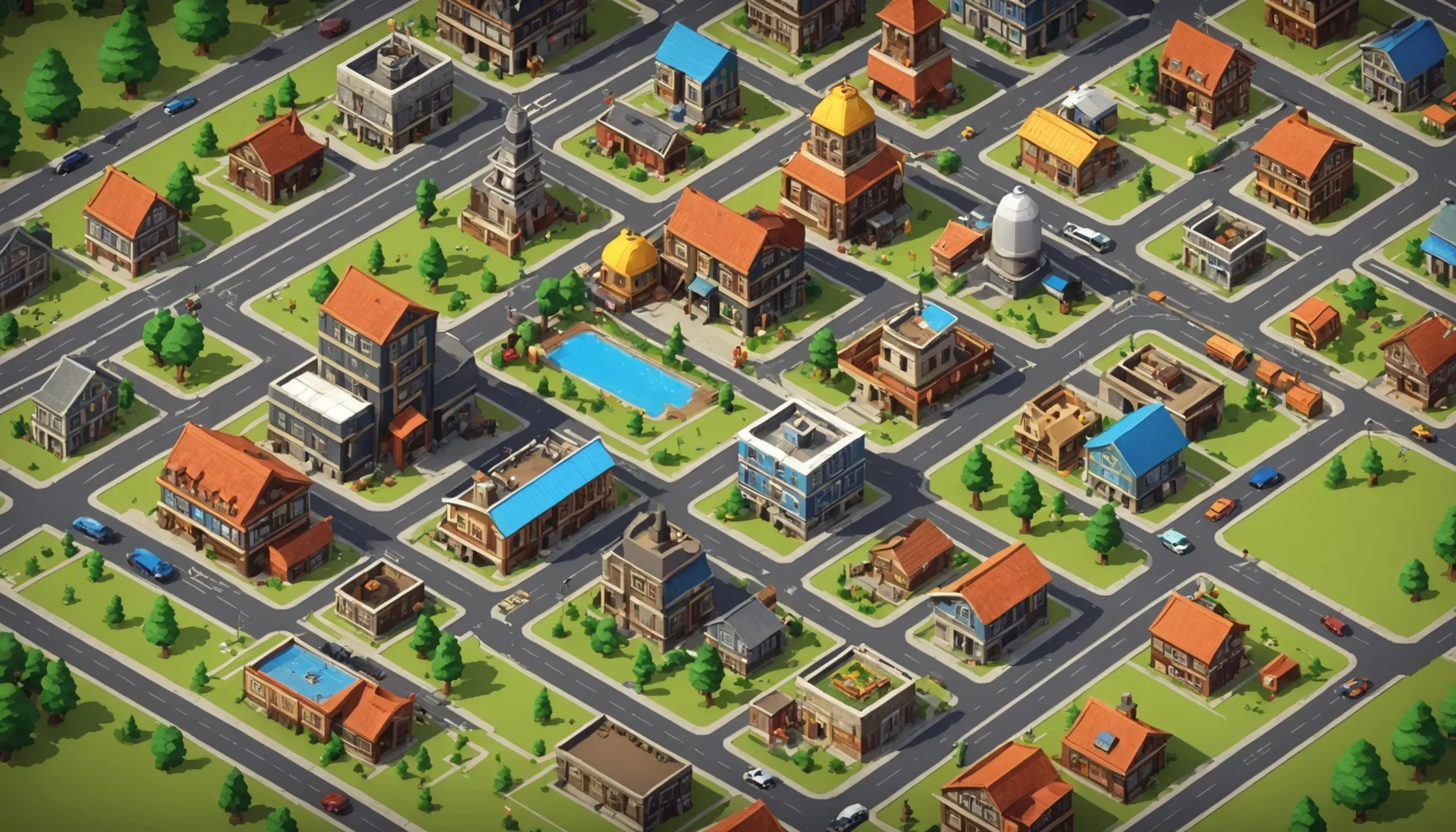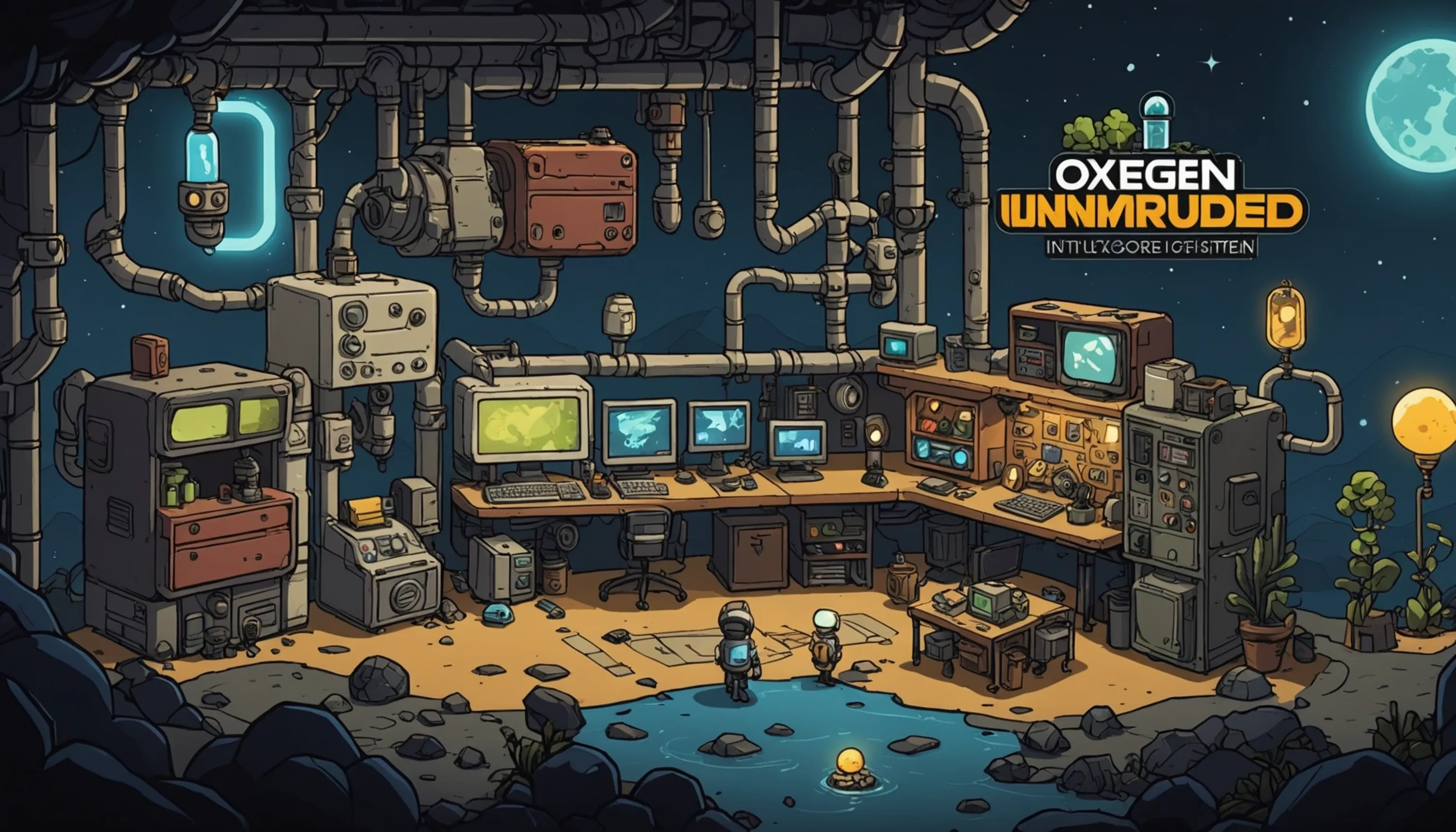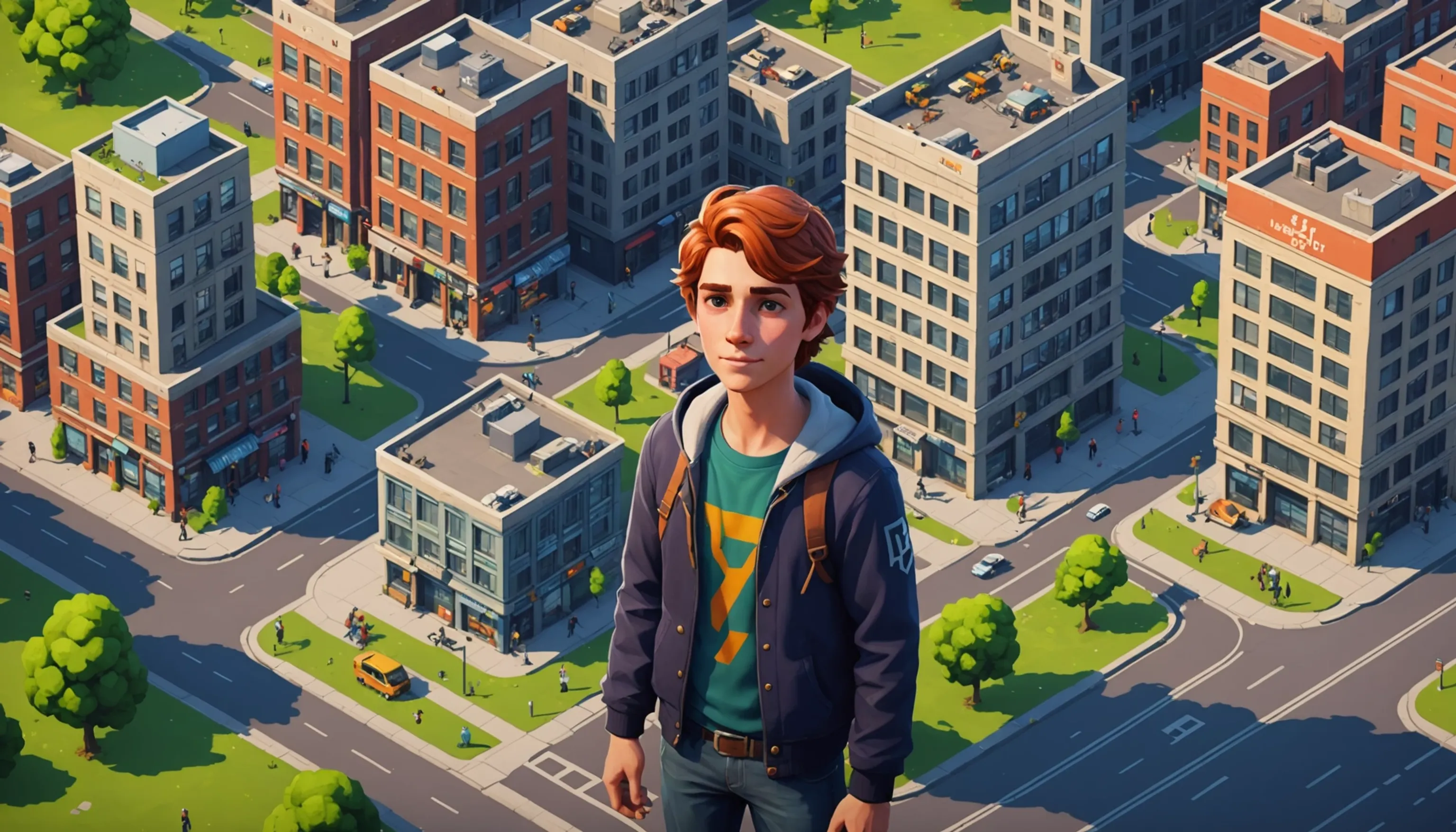New Indie City-Builder Games
 HvWHenry van Wagenberg
HvWHenry van Wagenberg
Top New Indie City-Builder Games to Explore
If you're looking for exciting new indie city-builder games to explore, there are some fantastic titles that offer unique gameplay experiences. These games allow players to unleash their creativity by designing and managing their own cities, often with charming graphics and engaging mechanics. Some notable titles include:
- City of Bridges: A game that challenges players to connect islands with intricate bridge systems.
- Eco: Focuses on sustainability, requiring players to build cities while considering environmental impacts.
- Oxygen Not Included: A space colony simulation game where players must manage resources and maintain a livable environment.
These games not only entertain but also foster critical thinking and problem-solving skills.
What Makes Indie City-Builder Games Unique?
Indie city-builder games stand out in the gaming landscape due to their distinct approach to gameplay and storytelling. One of the most notable features is their emphasis on creativity. Unlike larger studio games, indie developers often prioritize innovative mechanics and artistic designs, allowing players to shape their cities in imaginative ways.
Many indie city-builders also focus on themes and narratives that reflect real-world challenges. For instance, games like Eco challenge players to build sustainable cities while considering environmental impact, promoting awareness of ecological issues. This combination of gameplay and social responsibility engages players on a deeper level, making the experience both fun and educational.
Furthermore, indie city-builder games often embrace a more experimental approach to design. This means players can encounter unconventional gameplay mechanics that keep them engaged. For example, some games might incorporate resource management in unique ways, requiring players to strategize and think critically about their choices.
Another unique aspect is the community-driven nature of indie games. Many developers actively seek feedback from players, allowing them to shape the game's future through updates and expansions. This connection fosters a sense of belonging among players, as they feel their opinions are valued and contribute to the game's development.
Overall, indie city-builder games offer a refreshing alternative to mainstream titles, providing an enriching experience that combines creativity, education, and community engagement.
Benefits of Playing City-Builder Games for Teens
Playing city-builder games offers numerous benefits for teenagers, making them an enjoyable and educational pastime. One of the primary advantages is the enhancement of critical thinking skills. These games challenge players to plan strategically, manage resources, and solve complex problems. For instance, teenagers learn to balance budgets, allocate resources effectively, and make decisions that will affect the growth of their virtual cities.
Moreover, city-builder games foster creativity. Teens can unleash their imagination by designing and customizing their cities, experimenting with different layouts, and developing unique aesthetics. This creative freedom encourages self-expression and can even inspire real-world interests in architecture and urban planning.
Another significant benefit is the development of organizational skills. Managing a city requires careful planning and prioritization. Players must keep track of various elements, such as population needs, infrastructure, and environmental impact, which helps teens learn how to juggle multiple tasks efficiently.
City-builder games also promote collaboration and social interaction, especially when played in multiplayer settings. Teens can work together to build cities, share strategies, and learn from each other. This collaborative environment fosters teamwork and communication skills.
Lastly, these games can be a great stress reliever. Engaging in a virtual world where they can create and control their environments allows teenagers to escape from daily pressures and enjoy a sense of accomplishment as they watch their cities thrive.

Recommended New Indie City-Builder Games
Here are some recommended new indie city-builder games that are worth exploring:
- Against the Storm: A unique blend of city-building and roguelike mechanics, where players must adapt to changing climates.
- Farming Simulator 22: While focused on farming, it incorporates city-building elements as players create and manage their agricultural enterprises.
- Little Cities: A charming virtual reality city-builder that emphasizes creativity and relaxation.
- City of Bridges: A game centered around connecting islands through intricate bridge-building mechanics.
These titles offer engaging gameplay and plenty of creative opportunities for players.
Game 1: Overview and Features
Against the Storm is a groundbreaking indie city-builder that combines classic city management with roguelike elements. Set in a dark fantasy world, players take on the role of a Viceroy tasked with building a city for a diverse range of inhabitants, including humans, beavers, and lizards. The game challenges players to adapt to an ever-changing environment, where each season brings new challenges and opportunities.
One of the standout features of Against the Storm is its dynamic weather system. Players must navigate through storms, droughts, and other environmental changes that impact resource availability and city development. This adds an exciting layer of strategy, as players need to plan ahead and adjust their tactics accordingly.
The game also offers a deep progression system, allowing players to unlock new buildings, technologies, and upgrades as they progress. This encourages exploration and experimentation, as players discover various ways to optimize their cities. The rich lore and immersive world-building draw players in, making them feel connected to the inhabitants they serve.
Additionally, Against the Storm emphasizes resource management, requiring players to carefully balance the needs of their citizens while maintaining a sustainable environment. With its unique blend of mechanics and engaging gameplay, this game is a must-try for fans of city-building and strategy games alike.
Game 2: Overview and Features
Little Cities is an innovative indie city-builder designed exclusively for virtual reality (VR) gameplay. This charming game invites players to immerse themselves in a vibrant, miniature world where they can create and manage their own city. With its intuitive controls and delightful graphics, Little Cities offers a unique experience that transports players into a bustling urban environment.
One of the standout features of Little Cities is its accessibility. The game is designed to be user-friendly, making it suitable for players of all ages. Using hand gestures and VR controllers, players can easily place buildings, roads, and other structures while enjoying a 360-degree view of their creations.
The game encourages creativity, allowing players to design their cities with unique layouts and aesthetics. Players can choose to develop residential areas, commercial districts, and recreational spaces, all while managing the needs of their citizens. Balancing the demands for housing, jobs, and leisure activities adds an engaging layer of strategy.
Additionally, Little Cities features a soothing soundtrack and charming sound effects, enhancing the overall atmosphere. The game also includes various challenges and scenarios, encouraging players to adapt their strategies and keep their citizens happy.
With its whimsical art style and immersive gameplay, Little Cities is a delightful choice for anyone looking to experience city-building in a fresh and engaging way.

Game 3: Overview and Features
Oxygen Not Included is a critically acclaimed indie city-builder that takes players on a unique journey into the depths of space. In this game, players manage a group of colonists stranded in an asteroid. The primary objective is to build and maintain a sustainable underground colony while ensuring the survival of the inhabitants. This game combines city-building with survival mechanics, creating a challenging yet rewarding experience.
One of the standout features of Oxygen Not Included is its intricate resource management system. Players must carefully monitor the needs of their colonists, managing essentials like food, water, and oxygen. Each resource is finite, requiring strategic planning to ensure the colony thrives. For instance, players need to dig tunnels, set up power systems, and create farming areas, all while avoiding hazardous elements like toxic gases and extreme temperatures.
The game also boasts a rich and detailed simulation engine. The interactions between various systems—such as temperature, pressure, and gas diffusion—offer players a complex puzzle to solve. This depth encourages experimentation, as players can discover innovative solutions to challenges.
Moreover, Oxygen Not Included features a charming art style, with quirky animations and humorous characters that add personality to the gameplay. With its engaging mechanics and emphasis on problem-solving, this game is a must-play for fans of city-building and strategy genres.
How to Encourage Healthy Gaming Habits
Encouraging healthy gaming habits in teenagers is essential for their overall well-being. Here are some effective strategies:
- Set Time Limits: Establish clear guidelines on daily gaming time. This helps prevent excessive play and ensures balance with other activities.
- Designate Gaming Zones: Create specific areas for gaming to promote a focused environment. This can help teenagers avoid distractions and maintain a healthy separation from their gaming space.
- Encourage Breaks: Remind teens to take regular breaks during gaming sessions. Short breaks can improve concentration and prevent fatigue.
- Discuss Game Content: Engage in conversations about the games they play. Understanding the themes and mechanics fosters critical thinking and helps teens process their gaming experiences.
- Promote Physical Activity: Encourage outdoor play or sports to balance screen time with physical exercise.
By implementing these strategies, parents and teachers can help teens develop a healthier relationship with gaming.
Setting Time Limits on Gameplay
Setting time limits on gameplay is a crucial aspect of promoting healthy gaming habits among teenagers. With the immersive nature of video games, it can be easy for players to lose track of time, leading to excessive screen time that may impact their physical and mental well-being. Implementing structured time limits can help maintain a balance between gaming and other important activities, such as homework, family time, and physical exercise.
Start by discussing the importance of time limits with your teen. Explain how excessive gaming can lead to fatigue, decreased productivity, and even social isolation. Collaboratively set realistic daily or weekly gaming limits that take into account their schedules and responsibilities. For example, you might agree on two hours of gaming during weekdays and a bit more on weekends.
Using timers or gaming apps can help enforce these limits. Many consoles and devices have built-in parental controls that allow you to monitor and restrict gaming time. Encourage your teen to use these features to develop self-discipline and accountability.
Additionally, consider rewarding them for adhering to their gaming schedule. Positive reinforcement can motivate them to follow the agreed-upon limits while also reinforcing the value of time management. By setting and respecting time limits, teens can enjoy gaming as a healthy, balanced part of their lives.
Discussing Game Content Together
Discussing game content together is an invaluable practice for parents and teenagers, as it fosters open communication and critical thinking about the media they consume. Engaging in conversations about the games your teen plays can help you understand the themes, narratives, and mechanics that captivate them, while also providing an opportunity to address any concerns that may arise.
Start by asking open-ended questions about the games they enjoy. For example, inquire about the storyline, character development, and gameplay mechanics. Encourage your teen to express their thoughts and feelings about the game. This not only shows that you value their opinions but also helps them articulate their ideas more clearly.
Discussing potentially sensitive topics, such as violence or ethical dilemmas within the game, can also be beneficial. Encourage your teen to analyze the choices characters make and the consequences that follow. This can promote empathy and moral reasoning, allowing them to think critically about the actions and decisions presented in the game.
Additionally, sharing your own experiences and perspectives can enhance the conversation. Relating gameplay to real-world scenarios can help your teen draw parallels between the game world and their own lives. By discussing game content together, you create a supportive environment that nurtures healthy gaming habits and strengthens your relationship.
